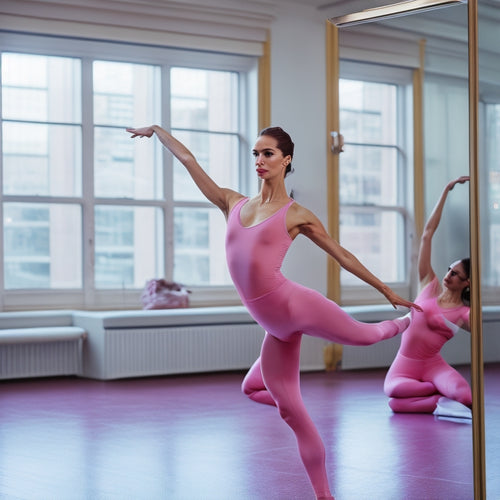
What Online Courses Do Dance Makeup Artists Need?
Share
To thrive as a dance makeup artist, you'll need online courses that cover a range of essential skills. First, you'll need to establish a professional online presence and master dance makeup techniques, including digital design and contouring. You'll also require business skills, like financial planning and marketing strategies, to attract and retain clients. Additionally, courses on creating engaging online learning experiences and staying up-to-date with industry trends are vital. By investing in these areas, you'll set yourself up for success in the competitive dance makeup industry - and discover even more secrets to elevating your career.
Key Takeaways
• Dance makeup artists need online courses that teach digital makeup design, contouring, and special effects techniques for theatrical performances.
• They require business skills courses to develop entrepreneurial skills, financial planning, and marketing strategies for attracting clients.
• Online courses on creating engaging online learning experiences can help dance makeup artists build a strong online presence and community.
• Staying up-to-date with industry trends through online courses on trend forecasting, social listening, and market gap analysis is essential for dance makeup artists.
• Building a professional online presence through online courses on branding, website creation, and social media management is crucial for dance makeup artists.
Building a Strong Foundation Online
By establishing a professional online presence, you can lay the groundwork for a thriving career as a dance makeup artist, leveraging the vast reach and accessibility of the digital sphere to showcase your skills and attract potential clients. A strong online presence is essential in today's digital age, allowing you to connect with potential clients, collaborators, and industry leaders from around the world.
Creating a digital portfolio is an important aspect of building your online presence. This visual representation of your work showcases your skills, creativity, and attention to detail, giving potential clients a glimpse into your artistic vision. Your digital portfolio should be easy to navigate, visually appealing, and regularly updated to reflect your growth as a dance makeup artist.
Mastering Dance Makeup Techniques Virtually
As you solidify your online presence, you're now ready to hone your skills in dance makeup artistry, and online courses can provide you with the technical expertise needed to master various dance makeup techniques. With the rise of virtual learning, you can now refine your skills from the comfort of your own space. Online courses offer a unique opportunity to learn from industry experts and perfect your craft without the need for physical attendance.
Here are some key areas to focus on:
-
Virtual Brushstrokes: Master the art of digital makeup design, learning how to create stunning looks using digital tools.
-
Learn Digital Contouring techniques to enhance facial features and create dramatic effects.
-
Discover how to work with different skin tones and facial structures to create bespoke looks.
-
Develop your skills in creating natural, everyday looks for dance performances.
-
Explore the art of special effects makeup for more dramatic and theatrical performances.
Business Skills for Dance Artists
Mastering your dance makeup skills is essential, but now you must also cultivate the business acumen required to transform your passion into a successful career. As a dance makeup artist, you're not just an artist, you're an entrepreneur.
You need to think like a business owner, not just a freelancer. This means developing a solid understanding of financial planning, including budgeting, invoicing, and tax management. You'll need to create a financial safety net to make sure you can weather any slow periods or unexpected expenses.
You'll also need to develop effective marketing strategies to attract and retain clients. This might include building a strong online presence, creating engaging content, and leveraging social media to showcase your work. You'll need to identify your target market, understand their needs, and develop a unique value proposition that sets you apart from the competition.
Creating Engaging Online Learning Experiences
To effectively reach and engage a wider audience, you'll need to create online courses that not only showcase your expertise as a dance makeup artist but also provide an immersive and interactive learning experience that resonates with your students. This is vital in today's digital age, where learners crave connection and personalized guidance.
To achieve this, focus on incorporating the following elements into your online courses:
-
Interactive Content: Incorporate quizzes, gamification, and hands-on exercises that encourage students to participate and engage with the material.
-
Virtual Mentorship: Offer one-on-one support, live sessions, or video feedback to provide personalized guidance and feedback.
-
Real-Life Examples: Use case studies, demonstrations, or tutorials that illustrate how to apply makeup techniques in real-world dance performances.
-
Community Building: Create a private online community or forum where students can connect, share their work, and learn from one another.
-
Continuous Feedback: Regularly solicit feedback from students to refine and improve the course content and delivery.
Staying Up-To-Date With Industry Trends
You must commit to ongoing education and professional development to stay current with the latest trends, products, and techniques in the dance makeup industry, ensuring your online courses remain relevant and effective.
Staying up-to-date with industry trends is vital to creating engaging and informative online courses that resonate with dance makeup artists. One way to do this is through trend forecasting, which involves analyzing current trends and predicting future ones. This enables you to anticipate changes in the industry and adapt your courses accordingly.
Another essential skill is social listening, which involves monitoring social media and online conversations to stay informed about the latest developments and preferences in the dance makeup industry. By doing so, you'll be able to identify gaps in the market and create courses that address specific needs and interests.
Frequently Asked Questions
Can I Learn Dance Makeup Artistry if I Have No Prior Experience?
You can definitely learn dance makeup artistry from scratch! Start by building confidence through online tutorials and setting goals for your skills development - with dedication, you'll be creating stunning looks in no time.
Do I Need a License to Practice Dance Makeup Artistry Online?
As you venture into the world of dance makeup artistry, you wonder, do you need a license to practice online? Thankfully, the answer is no, but don't forget to research certification requirements and register your business to maintain legitimacy.
Can I Use Regular Makeup Products for Dance Performances?
"When you're working on a dance performance, you'll want to choose products that can withstand sweat and intense stage lighting, so you'll need products with high product durability, ensuring your makeup looks flawless under those bright lights."
How Do I Handle Clients With Sensitive Skin or Allergies?
'When working with clients who have sensitive skin or allergies, you'll want to conduct thorough skin testing and patch tests to guarantee their safety, and always have a hypoallergenic kit on hand for emergency situations.'
Are Online Courses Recognized by the Dance Industry and Clients?
As you step into the spotlight, you wonder if online courses will get you industry recognition. Rest assured, accreditation matters - look for courses meeting industry standards, and clients will take notice of your expertise, shining like a diamond in the rough.
Related Posts
-

What Contemporary Dancewear Essentials Do Dancers Need
As a contemporary dancer, you need essentials that enhance your flexibility and creativity. Opt for high-waisted legg...
-

Dance Practice Wear Picks for Maximum Comfort and Performance
When choosing dance practice wear, you want gear that optimizes comfort and performance. Opt for moisture-wicking fab...
-

Mastering Dance Photography: Expert Tips and Techniques
You're about to excel in dance photography, a challenging field where only a few succeed. To join the elite 10%, you'...


